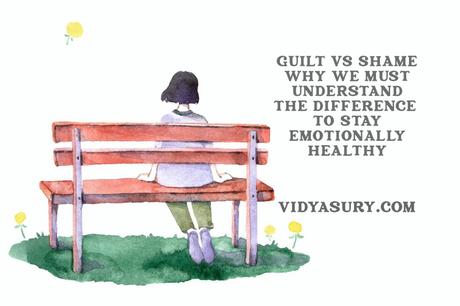
We were talking about guilt vs shame during our evening walk yesterday after some ranting about family conversations and in the course of it, so many things came out-things we would normally not speak about. One thing was clear at the end of it-the realization that we must understand the difference between guilt and shame if we wanted to stay emotionally healthy.
It is a fact that everyone will experience guilt and shame countless times throughout their lives. These negative emotions make us feel self-conscious and bad about ourselves and end up making us feel emotionally vulnerable. Nevertheless, both guilt and shame play an important role in our lives.
Before we go into the difference between guilt and shame, let's look at a definition of these emotions.
Guilt vs shame
Guilt is when someone feels bad about the behavior they exhibited.
Shame is when someone feels bad about who they are as a person because they have mistreated someone.
I would be the first to acknowledge that it is easier to remedy guilt than shame because guilt involves making up for bad behavior while shame means changing ourselves.
So why should we know the difference between guilt and shame?
As I said earlier, being aware of the guilt vs shame difference is critical for our emotional as well as spiritual health. Understanding the difference enables us to respond appropriately in situations and also ask others to respond to us appropriately, fairly.
It is important that we know this:
- Are we feeling bad because we did something?
- Have we just made it a habit to feel bad?
Our conscience is always on the alert, managing our moral compass, to tell us when we have behaved or acted in a way that is not aligned with our values. For example, if we believe in honesty and end up lying, we will feel guilty-even if we excuse ourselves saying it is a white lie.
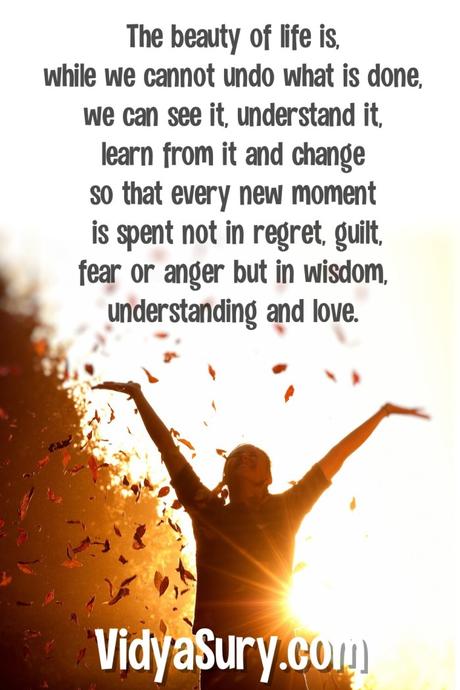
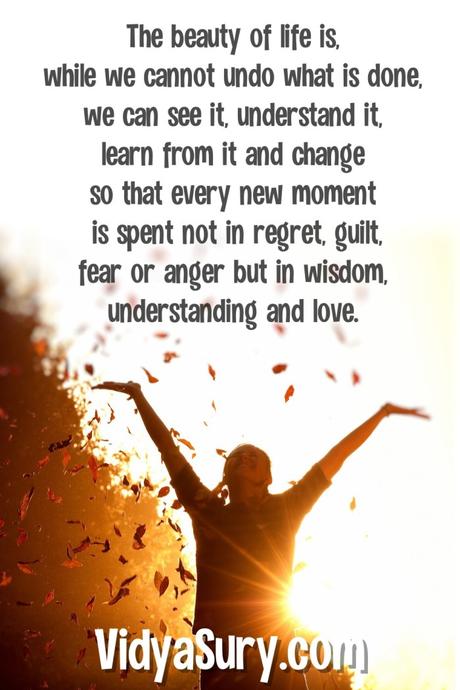
If we believe in the do-unto-others rule, we will feel guilty if we treat someone badly. So, guilt is feeling bad about our actions, not about who we are. We can tell the difference between the goodness of who we are basically, and the mistake we made-a mistake we need to correct. This can involve making amends or asking for forgiveness.
Guilt can be a motivator for positive change-because when we do something wrong, we feel guilty and this can motivate us to change our behavior so we don't repeat the same mistake.
How to cope with guilt?
- Face the feelings of guilt. Then release these feelings by talking about them, sharing, confessing, being honest.
- Forgive yourself. Ask yourself if you are judging yourself too harshly.
- Trace the origins of your guilt-is the reason rational or reasonable? Irrational guilt can be because of something you really had nothing to do with.
- Change the related behavior so that the triggers of guilt and remorse stop. So, if you are doing something that makes you feel guilty, stop doing it and you won't feel guilty. Simple.
- Make new values for yourself. Then take action now rather than dwelling on the past. Take positive action to make your life better, feel better. Going forward, what can you improve?
- Practice empathy and forgiveness to learn to forgive yourself. Try and cultivate the habit of forgiving others, helping others and doing good things.
- Apologize where you can or just seek peace. Can you do or say something to show you are willing to make peace with those you hurt or have a disagreement with?
- Learn to let go. The past is in the past. At some point, even if you did things you hurt someone, if you feel sorry now, you have to let them go. If you are truly remorseful and you tried to make up for it, you can forgive yourself even if that other person won't. The same way, if someone who hurt you is sorry, learn to let it go so you can forget the hurt and focus on going forward.
- Consider if there was a legit cause for the way you acted in the past that was beyond your control at the time? Cut yourself some slack. Don't judge yourself too harshly. Instead, focus on changing your behavior in a way that will lead to better decisions in the present and future.
- Avoid shame.
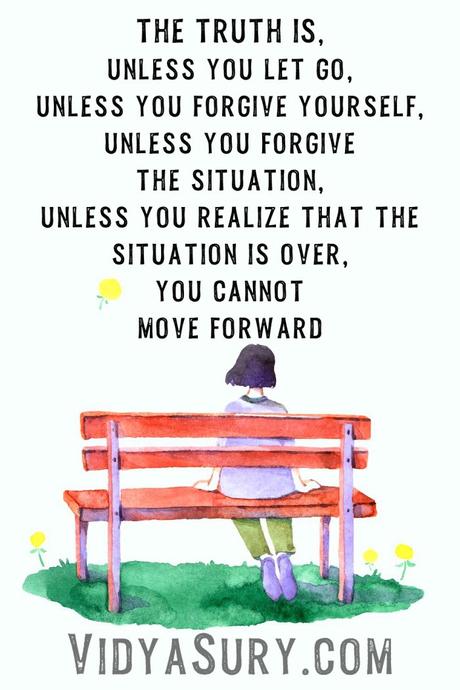
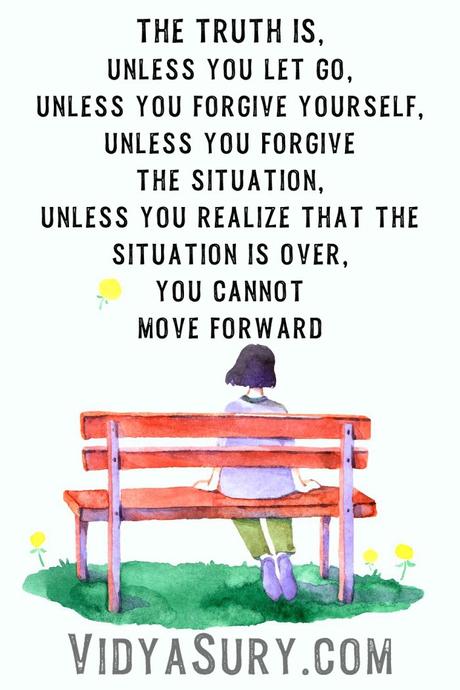
When we feel shame, it is not for what we did or a specific behavior, but who we are. When we experience shame, we want to hide. We think we don't deserve love or respect - we feel that we are not enough. We feel inferior. We see ourselves as failures, flawed. We often don't realize we carry shame-because sometimes it fills us to the extent that it can feel pretty normal. Okay, not pretty, but normal.
The feeling of shame creates an aura - a vibe. People pick up on this energy and assume we've done something wrong or behaved badly and react accordingly - and make us believe that we deserve the punishment overdose.
Sometimes, we don't even know that we carry our shame and are puzzled when others are mean to us. You know what they say about people mirroring how we feel about ourselves. This is why it is important to heal our shame.
When we carry shame, we act in ways that result in our feeling guilty. Can you see where that's going? The hamster wheel of guilt and shame - a vicious cycle.
How can we heal our shame?
Here is a 4-step process to break the shame cycle.
The first thing to do is know the difference between guilt and shame. What are the symptoms of shame? If you recognize even one of the following, you are probably living in shame.
- The first step in breaking the cycle is learning to discern between guilt and shame. The following are the chief symptoms of shame. If you can identify with even one of these points, you are likely to be living in shame.
- You compare yourself to others and always find that you fall short.
- You are embarrassed when someone compliments you-you think you don't deserve it.
- You have a general sense of unworthiness.
- You are always suspicious when others like or respect you - you are always waiting for the other shoe to drop in every relationship.
- You accept excessive blame-far more than the situation calls for.
- You always behave in ways that go against your own standards of behavior
- You feel bad about certain thoughts even when you have no intention of acting on them.
Let's go to the next step, now.
Now that you know to recognize the symptoms in the guilt vs shame game, you must look at your recent wrongs in an objective manner. What triggered these behaviors? What did you do about remedying your actions? Did you over-apologize? Did you let someone punish you-physically or with words-for your behavior?
If you overcompensated in any way, you are carrying shame, not just guilt, and you are harming yourself.
Step 3 is to retrace your path to where the shame began. Invariably, shame begins during childhood when an adult you trust shames you for something that is not in your control. It can be your sexuality, your intelligence, the way you spoke or dressed, or a behavior you had no idea was not okay. As children, we tend to soak up shame easily.
I've personally gone through the above and I know how it feels-it took decades to break out of that cycle and realize I didn't have to carry it with me.
The final step is to look at the past with adult eyes. Would you want to shame a child for what you feel shameful about? Let the child within you know that it is not hers to carry. Let the child in you know that you release her from the shame now.
I watched a TED talk by Brené Brown where she talks about guilt vs shame. She says that shame is an unspoken epidemic, the secret behind many forms of broken behavior. She explores what can happen when people confront their shame head on. Watch it here:
She says, about guilt vs shame:
Shame is a focus on self, guilt is a focus on behavior. Shame is "I am bad." Guilt is "I did something bad." How many of you, if you did something that was hurtful to me, would be willing to say, "I'm sorry. I made a mistake?" How many of you would be willing to say that? Guilt: I'm sorry. I made a mistake. Shame: I'm sorry. I am a mistake.
At the end of the day, as we fight the guilt vs shame battle, we must understand that guilt and shame are social emotions that we have to acknowledge because they hold people back from acting selfishly.
While we do need to identify and try to repair the damage that has led to guilt and shame, we must also forgive ourselves. Otherwise, these emotions can weigh us down to the extent we can't function normally.
While forgiving ourselves, we must also try and forgive those that have wronged us especially if the other person realized what she has done and has tried to make amends.
Have you struggled with guilt vs shame?
How do you tackle it?

Here are some useful resources:
Some interesting research about reconsidering the differences between guilt and shame.
You might want to check out Jane Straus' book, Enough is Enough, Stop Enduring and Start Living Your Extraordinary Life to understand more about guilt vs shame and how to break out of it and thrive.
An infographic from NICABM on understanding guilt vs shame
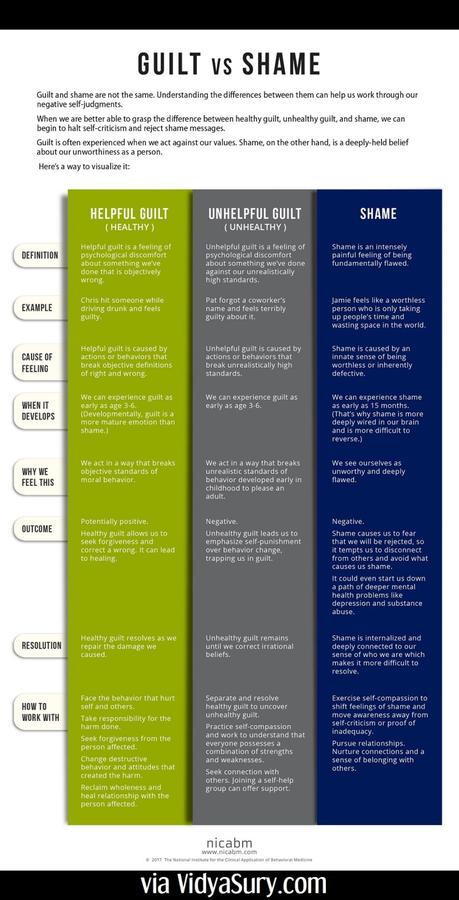
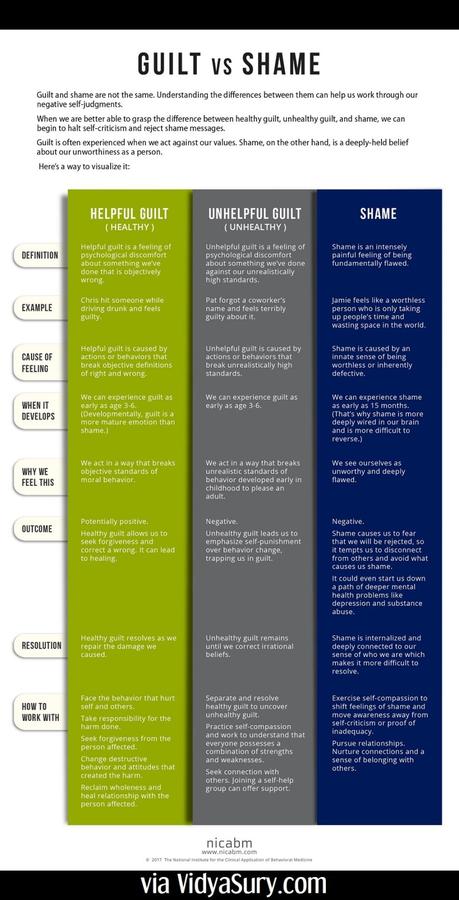
♥
Wednesday Wisdom is a series with short bursts of easy-to-consume wisdom in the form of inspiring stories, verse, quotes, anecdotes, reflections, easy meditation, thought-provoking questions and humor. Yeah, some days are not so short.
